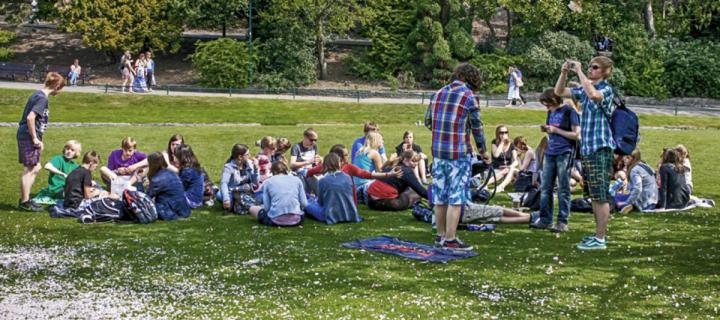Understanding the Value of Universal Youth Work
Research demonstrating the educational, personal, and social benefits of universal youth work has emphasised its role in improving the community-based learning and development of young people beyond school education.

Research hubs
Research experts
Dr Ken McCulloch
What was the problem?
Youth work is, by nature, informal and participation by young people is voluntary. The practice is based on an educational partnership between young people and practitioners concerned with nurturing personal and social development. Youth work services are generally complementary to formal schooling but contribute significantly to curricular goals such as health and wellbeing. Despite anecdotal evidence of positive outcomes, a long standing problem is the assumption that youth work is a good thing, without a body of evidence to support this assumption. This has created a challenging context as governments and local authorities increasingly demand youth work practitioners justify their work against certain frameworks (for example the Curriculum for Excellence) and are tasked with directly contributing to policy imperatives (such as employability skills).
Academic publications and government reports have commonly failed to capture the wide-ranging tangible impact of youth work on young people. In contrast, the contemporary policy context increasingly emphasises achievement of positive destinations in the transition from adolescent to adult. Compounding this problem is the need and desire for youth work practitioners to access new and emerging evidence, analysis, critique, and knowledge on the social purpose and impact of youth work.
What did we do?
Ian, Callum, and Ken worked closely with the Edinburgh Youth Work Consortium (EYWC) to conduct and publish a systematic review of respected evidence linking the impact of youth work to the beneficial development of participating young people. The focus was on universal youth work. This is defined as practices that are openly available to all children and young adults (as opposed to targeted intervention) and where the stated purpose is not pre-determined or aimed at addressing specific issues or problems as defined by policy-makers.
This research followed on from other contemporary international literature reviews. The Department of Children and Youth Affairs in Ireland (2013) commissioned a systematic review of research literature pertaining to youth work in order to develop a youth policy framework.
A major study published in 2014 by the European Commission reported on the wide contribution of youth work and identified the elements of successful practice.
Building on these projects the literature review undertaken by the researchers was focused on Universal Youth Work and the emergent findings directly related to the policy context in Scotland, particularly the desired national outcomes of the Scottish Government.
What happened next?
The research found evidence that universal youth work produces positive outcomes for health and wellbeing, makes a contribution to improving formal educational outcomes, impacts on employability, and provides safe yet challenging spaces for personal and social development and intercultural learning.
The research produced two initial reports including a summary report (viewed 1,478 times between April 2015 – April 2016) and a full literature review, accessed by practitioners across Scotland. The launch of the literature review on 2 April 2015 was picked up on Twitter by professionals working at youth centres, the NHS, the YMCA, Mentors in Violence Prevention, and the Children’s Parliament. Ian was subsequently invited to present the findings with 25 YMCA staff responsible for managing local associations and services across Scotland (June 2015), and to 50 senior youth work leaders at the Youth Work Manager’s Conference (June 2015). The research has also been used as part of a continuing professional development training day for 20 youth workers in Dumfries and Galloway (February 2016).
The research influenced the EYWC’s “Youth Work Statement of Intent” (August 2015), which was cited in the Edinburgh Council’s York Work Services Redesign report (October 2015, item 7.14). The finding that there are many gaps in the peer-reviewed evidence base is also cited in the Hall Aitken report, “Social and economic value of youth work in Scotland: initial assessment” (January 2016), commissioned by YouthLink Scotland. The research is cited in the Youth Work Research in Scotland Overview (2016), part of the government funded National Youth Work Strategy 2014-2019.
Ian was invited to speak at the Stakeholder Reference Group for the Youth Work Strategy, a government advisory board (June 2016). This key forum for the development of the youth work sector in Scotland gave resounding support to taking forward a national research strategy in youth work. The researchers have been consistent partners in the evolution of this process.
Practitioner and academic interest in the literature review generated the establishment of a steering group of professionals from the public, third, and higher education sectors. This steering group will oversee a longitudinal 5-year study investigating the transitional experiences of young people participating in youth work. The researchers, in collaboration with colleagues at the University of Glasgow and University of Exeter are designing a national research strategy. The researchers are taking the lead on the design and implementation of a year-long qualitative pilot study.
It really did make me re-think the work that I’m delivering & realise that we’re pretty close to digressing from the real purpose of Youth Work.
Your session… was exceptionally well received by the staff and the knowledge they have gained from this session will no doubt benefit them in their current work, and future projects.

